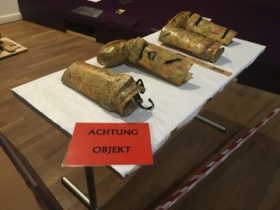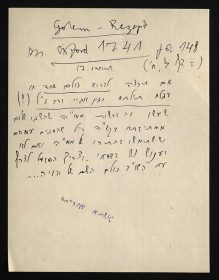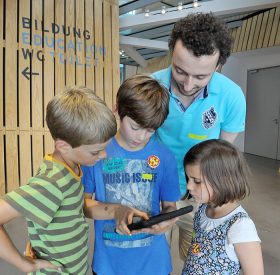
Golem Costume for Death, Destruction, and Detroit II at the Schaubühne Berlin, 1987. Directed by Robert Wilson; Lender: The Jewish Museum, New York
The Golem is brought to life from inanimate material, as is the exhibition we are dedicating to him. Up until the opening on September 22, many days will be spent building, painting, felting, typesetting, printing, writing, cutting, hanging and pouring. For the celebratory opening, we have invited as our special guest, a robot who will greet the public.

REEM and REEM C at a Meet-and-Greet © PAL Robotics, Barcelona

© Scholem Archives, The Jewish National and University Library, Jerusalem, Israel
But up until that moment, there is still a lot to be done. All of the objects and works of art have already arrived in Berlin. For example, the smallest item (14.5 x 11 cm), which is roughly the size of a post-it. On this piece of paper, Gershom Scholem (1897–1982), the scholar of Jewish mysticism, noted the beginning of the so-called “Golem Recipe,” which he had discovered in a medieval manuscript during his research at Oxford. → continue reading
An Interview with Ines Pohl
The European Union currently faces a tensile test: Great Britain’s vote to exit, the rise of rightwing populist movements, the lack of a solution to the flow of refugees, fear of terror attacks, and economic decline. Reference is often made, in the political debate about how to respond to these issues going forward, to history.
At our event, “Times of Crisis” on 7 September 2016, we would hence like to discuss the significance of the past for current European politics, particularly considering today’s problems, together with international guests from Great Britain, France, and Poland, as well as Germany. The panel will consist of Dan Diner, Dietmar Herz, Étienne François, Hans Kundnani, and Adam Michnik. The moderator will be Ines Pohl, of whom we asked four questions that extend our view to include the USA.
Nevin Ekinci: Ms. Pohl, you have been in Washington since the end of 2015 as the correspondent for Deutsche Welle. How do you perceive the debates about the current European “crisis,” from a distance? Would you even use the term “times of crisis?” → continue reading
Our Summer Vacation Program for Modern Scavenger Hunters

David Studniberg with three scavenger hunters; photo: Doris Spiekermann-Klaas, Verlag Der Tagesspiegel
Even now, scavenger hunters are investigating the hole next to the coin track and taking funny pictures with the iPad. Tom, an eight-year-old tyke with a mop of brown curls on his head, is reading the next instruction out loud: “Now look for the black arrows on the floor and follow them until you get to the Chill Corner. There, you can…” But before Tom can finish the sentence, both of his fellow searchers call out excitedly: “Over there, that’s the corner! Come on!” In a flash, the three of them dash off, past Moses Mendelssohn, towards the “Chill Corner”, where they throw themselves on the comfortable pillows and eagerly read the next quiz question on the tablet.
This and similar scenes can be observed every day now during the holidays at our exhibition. Tom and his friends, you see, belong to a group participating in a new summer vacation program, App through the Museum. → continue reading




